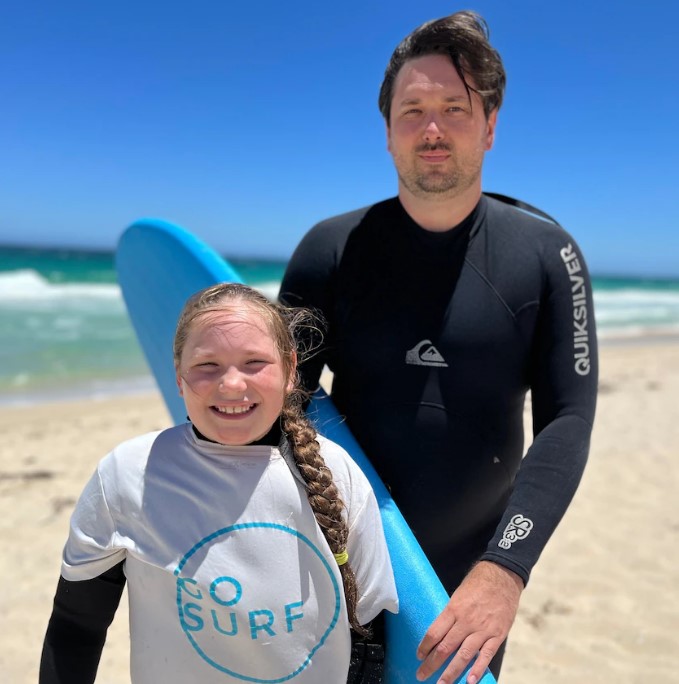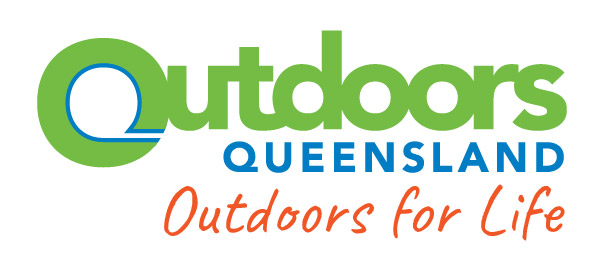Surfing helps kids on road to recovery
New surfing program at Perth Children’s Hospital

Ruby has been learning to surf to help with her recovery from burns she sustained at the age of four.
(ABC Perth: Jackson Worthington)
Children with chronic health conditions can spend a lot of time in hospital, but in WA a new program is trying to change that by giving them a dose of surf, sun, and fresh air.
Nine-year-old Ruby Taylor is one of the first patients to go through the program at the Perth Children’s Hospital (PCH), which involves teaching kids to surf to boost their physical and mental health.
The program has been put in place permanently after a pilot for children with cystic fibrosis found surfing had positive outcomes for patients.
Children and adolescents with type 1 diabetes, cystic fibrosis, burn injuries, arthritis, and post-sarcoma injuries can take part in the new program.
Ruby has undergone more than 20 surgeries since the age of four when she was seriously burnt after trying to get something out of the microwave.
The surf lessons have acted as a form of physical therapy, which means she does not have to spend so much time in hospital.
“Each time … I do the treatment, it gets better,” she said.

Key points:
- Children with chronic conditions can learn to surf through a new program at the Perth Children’s Hospital
- The surf sessions are personalised to cater to participants’ needs
- For Ruby Taylor, nine, the sessions aid her recovery from serious burns
Asha Taylor, Ruby’s mum, has noticed how the surf lessons have also helped the family through Ruby’s recovery.
She said regular hospital days involved lots of stress and visits to different doctors.
“It doesn’t matter how many surgeries she has, she still has the nervousness of going to the hospital and knowing the pain she is going to endure,” Ms Taylor said.
“Whereas coming down to the beach … it’s a super exciting experience for her.
“She loves being down here, she loves the instructors [and] she gets to stretch all of her skin and bones and get the exact same exercise she would at the hospital.”

Family joins in fun
Ruby’s dad, Alex, is also part of the lessons.
Ms Taylor said having family members take part made the treatment easier for Ruby.
“It’s very segregated in a hospital setting,” she said.
“We have to leave our younger daughter at home when we go to the hospital [but] at the beach, she’s down here, we’re all down here as a family.
“Ruby gets to show her skills because she’s better than my husband, so she’s very excited about [that].”
The surfing program started after PCH senior clinical psychologist Joanna White taught herself to surf.
She said the early pilot program had also shown great benefits for patients with cystic fibrosis.
“There’s a lot of emerging evidence about how the ocean … can actually make you feel good and give you a sense of wellbeing,” Ms White said.
“But surfing, even on top of that, is fun, it’s playful, it’s exciting, it tests your limits at times, and helps you to face your fears.”
Ms White said it was great to watch the families gain confidence with the help of the instructors.
She said patients worked with the same instructor to build a therapeutic relationship and meet their treatment goals.
“One of the things for kids with chronic conditions is that they’re often less likely — what we know from the research — to engage in team sports or physical activity for a number of reasons,” Ms White said.
“So this is a way of tailoring it to each child and making sure that they feel OK about getting involved in activities and facilitating it.”
“But surfing, even on top of that, is fun, it’s playful, it’s exciting, it tests your limits at times, and helps you to face your fears.”
Ms White said it was great to watch the families gain confidence with the help of the instructors.
She said patients worked with the same instructor to build a therapeutic relationship and meet their treatment goals.
“One of the things for kids with chronic conditions is that they’re often less likely — what we know from the research — to engage in team sports or physical activity for a number of reasons,” Ms White said.
“So this is a way of tailoring it to each child and making sure that they feel OK about getting involved in activities and facilitating it.”

Surf instructor Harley Waddell has been working with Ruby through her treatment.
He said it was rewarding to watch her gain confidence in the water.
“We want them to have fun,” Mr Waddell said.
“As long as the kids are out there having fun, enjoying themselves, they’re getting out of home [and] getting out of the harsh reality of what their lives can be.
“As long as they’re smiling by the end of it, we’re pretty happy about it.”
Stay in the loop!
Click the button below to subscribe to Outdoors Queensland newsletters and updates.
